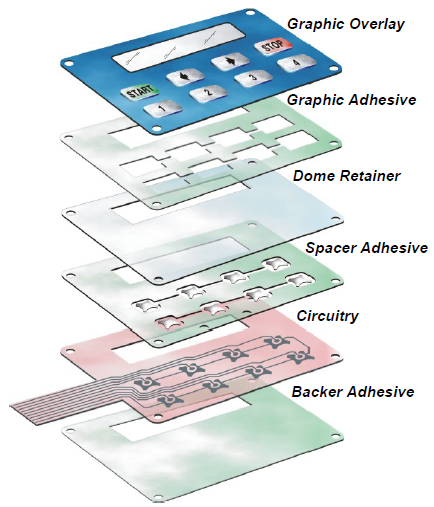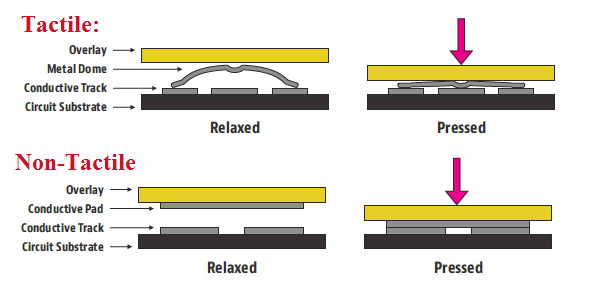Top Applications for Membrane Switches in Consumer Electronics
Top Applications for Membrane Switches in Consumer Electronics
Blog Article
Comprehending the Value of Membrane Switches in Individual Interfaces
Membrane switches are essential components in the design of effective user interfaces, helping with not only functionality but additionally boosting visual allure and individual interaction. Their distinct features, such as resistance to environmental factors and personalized layouts, make them ideal for a varied variety of applications across multiple sectors. As we check out the various advantages and future fads linked with Membrane innovation, it becomes clear that these buttons are greater than just components; they stand for a convergence of innovation and usefulness. The ramifications of this technology on customer experience are worth checking out additionally.
What Are Membrane Buttons?

The spacer layer, which contains glue buildings, enables the separation of the circuit layer from the overlay, guaranteeing that the button continues to be in a non-activated state up until pressed. When stress is put on the overlay, it compresses the spacer layer, linking the space and completing the circuit in the underlying layer. This layout not only reduces the physical room required for typical mechanical buttons but additionally improves the resilience of the tool, as Membrane buttons are typically immune to dust, dampness, and other ecological aspects.
Commonly located in applications ranging from customer electronics to clinical devices, Membrane buttons are essential to modern-day technology, providing a efficient and user-friendly interface that lines up with modern style needs.
Benefits of Membrane Buttons
While numerous button innovations exist, Membrane Switches offer unique benefits that make them particularly desirable in numerous applications. One of the key advantages of Membrane switches is their small layout, which allows for space-saving applications in gadgets where realty is restricted. Their thin profile not only improves visual allure but also assists in light-weight construction.
Another considerable advantage is their resistance to ecological variables. Membrane buttons are generally sealed against wetness, dust, and pollutants, making them excellent for usage in requiring settings, such as clinical devices and industrial equipment. This resilience prolongs the life expectancy of the switch, decreasing maintenance expenses and enhancing reliability.
Additionally, Membrane switches can be personalized to satisfy particular design requirements, incorporating unique graphics and shades that boost customer communication. Their tactile feedback options can additionally be customized to supply a gratifying individual experience. Additionally, Membrane buttons are affordable, particularly in high-volume applications, as they can be produced successfully.
Applications in Various Industries

In the consumer electronic devices field, Membrane buttons are widespread in gadgets such as microwaves, washing devices, and push-button controls. Their tactile feedback and visual alternatives improve individual experience while providing a sleek, contemporary appearance. Additionally, automotive manufacturers utilize Membrane switches in dashboard controls and infotainment systems, where area is limited, and individual interaction is important.
Moreover, the industrial sector leverages Membrane switches in control panels for machinery and tools, enabling user-friendly operation in usually extreme atmospheres. Their resistance to chemicals and moisture makes certain durability and reliability in these applications. On the whole, the versatility of Membrane Switches adds substantially to their widespread usage, making them important in various technical domains.
Style Factors To Consider for Membrane Buttons

When designing Membrane buttons, numerous essential factors to consider must be considered to ensure ideal capability and user experience. First of all, the selection of products is crucial; choosing durable, premium substratums can boost the switch's longevity and resistance to environmental variables such as dampness and temperature changes.
Secondly, check it out the style of the visuals overlay should prioritize clarity and ease of use. Icons and message must be understandable, and the layout should help with intuitive interaction (membrane switches). Additionally, tactile feedback is essential; incorporating a responsive dome or various other devices can improve the individual experience by offering physical confirmation of activation
Another important variable is the button's electrical performance. Designers have to make certain that the conductive traces are appropriately created to lessen resistance and avoid signal disturbance. This entails examining the needed actuation force and making certain compatibility with the digital components they will certainly user interface with.

Future Fads in Membrane Technology
As innovation proceeds to breakthrough, Membrane switches are poised to progress dramatically, driven by developments in materials and producing strategies. One arising fad is the incorporation of advanced materials, such as adaptable substratums and conductive inks, which boost longevity and reduce the overall weight of Membrane switches. These products not just boost the responsive feedback but also permit the design of switches that can withstand harsher environmental problems.
In addition, the assimilation of touch-sensitive modern technologies is changing typical Membrane Switches into more interactive interface. Capacitive touch sensing units installed within Membrane switch panels can provide a more instinctive and receptive individual experience, aligning with the growing need for smooth, contemporary designs in customer electronic devices.
Furthermore, developments in printing techniques, such as electronic and 3D printing, allow rapid prototyping and customization of Membrane switches. This flexibility permits makers to respond quicker to market demands and customer choices.
Lastly, sustainability is coming to be a considerable focus, with suppliers checking out environmentally friendly products and processes. As these fads unfold, the future of Membrane innovation assures improved functionality, aesthetic allure, and environmental duty, solidifying their duty in sophisticated interface across numerous industries.
Verdict
In conclusion, Membrane Switches represent an essential component in the style of interface, integrating capability with aesthetic versatility. Their benefits, including longevity and resistance to environmental aspects, make them ideal for diverse applications across numerous industries. Additionally, thoughtful layout factors to consider enhance individual communication and experience. As advancements in innovation proceed, the advancement of Membrane buttons is expected to additional fine-tune customer interfaces, driving innovation and improving functionality in a progressively intricate technical landscape.
Membrane switches are essential components in the design of effective customer interfaces, promoting not just performance however also enhancing visual charm and individual interaction.Membrane Switches serve as an essential part in different user interfaces, facilitating a smooth interaction in between customers and electronic devices.While countless switch technologies exist, Membrane Switches deal unique advantages that make them specifically preferable in various applications.In addition, Membrane buttons can be tailored to meet details style requirements, including distinct graphics and shades that improve user communication.In conclusion, Membrane Switches represent a vital check my source element in the this post design of individual interfaces, combining capability with aesthetic versatility.
Report this page